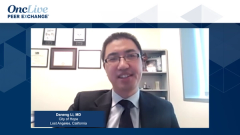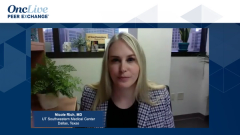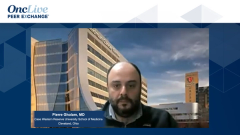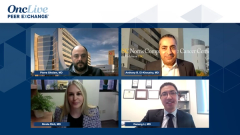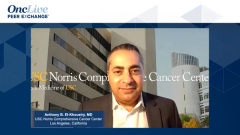
How the Potential Use of Immunotherapy in Intermediate HCC Might Affect its Use in Advanced HCC
Dr Nicole Rich discusses immunotherapy and potential combinations in intermediate and advanced hepatocellular carcinoma.
Episodes in this series

Anthony B. El-Khoueiry, MD: Dr Rich, immunotherapy combinations are being evaluated in different studies in intermediate-stage HCC [hepatocellular carcinoma]. These are usually BCLC [Barcelona Clinic Liver Cancer]-B patients. One example is the LEAP-012 study of TACE [transarterial chemoembolization] with lenvatinib Lenvima plus pembrolizumab [Keytruda] vs TACE plus placebo. Another study is the phase 3 ABC-HCC study of atezolizumab [Tecentriq]/bevacizumab [Avastin] vs TACE in intermediate-stage HCC. As these studies evolve, we don’t know if they’re going to be positive and if these will become standard in intermediate-stage HCC. But if they do, how will that shift the landscape of HCC treatment? It’s a tough hypothetical question, but any thoughts?
Nicole Rich, MD: Certainly, the immunotherapies are very exciting, all of these regimens, and we’re going to want to try to treat patients with earlier stage HCC. With intermediate stage, particularly patients who are beyond up to 7 criteria, patients with infiltrative tumors, those don’t appear to be amenable. There’s an idea of these un-TACE-able patients who shouldn’t get upfront TACE to begin with based on tumor features. It’s tantalizing to think about immunotherapies in intermediate stages.
What’s going to be difficult personally for interpretation of all of these studies of both combinations and I/O [immuno-oncology] therapies in the intermediate setting is the heterogeneity of the patients involved. BCLC-B or intermediate-stage HCC itself is so heterogeneous, but also when you start talking about locoregional therapy, there are regional variations in that and often relies on operator technique for locoregional therapy. To your point, this is going to be a very murky area where it’s going to be patient selection and center expertise. I don’t know if that answered your question.
Anthony B. El-Khoueiry, MD: These are important thoughts about this space of HCC, and we’ll see as the data evolve.
Transcript Edited for Clarity


